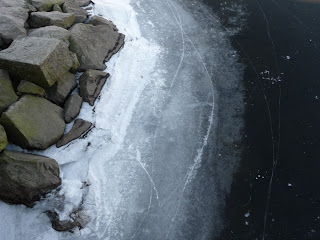Showing posts with label merkelige ting i virkeligheten. Show all posts
Showing posts with label merkelige ting i virkeligheten. Show all posts
Tuesday, 21 December 2010
covered in snow
I live in a country where we are used to snow, some even say we are born with skis on our feet...
But my hometown, Stavanger, is an exception. Its location by the North Sea and The Gulf Stream has normally secured us relatively snow-free winters, but not any more! Last year we had snow for three months, this year doesn't look any better. Right now its pouring (maybe not the right word when it comes to snow???) down. Here is what it looks like from the window of my study:
I must admit: Taking picture of snow snowing isn't the easiest of task for an amateur photographer ... The temperature is minus 4 degrees centigrade.
Labels:
hus og hage,
jul,
livet,
merkelige ting i virkeligheten
brave new world
I'm going digital
I had no idea how great it would be to read fiction on an iPad, but I can assure you:
ITS FANTASTIC!
These are the things I love about it:
- The dictionary: most of the books I read are written in English, which is not my mother tongue, the possibility to look up words there and then - as I read - is incredible easy in this system, it improves my reading a lot!
- I buy most of the books I read from abroad, buying digital = no delay, no postal expenses.
- Storage: I'm 43, my house is already filled with books, and yet I have so much more I want to read ...
- Order: As long as I can keep track of my iPad I know where to look for my books ...
- Ecology: isn't it good to reduce our consumption of paper? And isn't it also an advantage for the environment to stop shipping physical objects around the world???
ps: my first iPad read is Damon Galgut, I tell you more about his brilliant book later on ....
Sunday, 19 December 2010
Sunday, 12 December 2010
Judith Schalansky
I’ve been working on some short stories for a while. They are all set in a very ordinary everyday setting: A day at the beach, a family dinner, a morning walk, etc.
But then suddenly, to my surprise, one of my stories demanded to take place on an ice raft in the Arctic Ocean somewhere between the North Pole and the Russian tundra.
No wonder then, that I immediately fell in love with Judith Schalansky’s Atlas of Remote Islands. Fifty Islands I have not visited and never will. The title in itself is really enough to make one marvel!
A great review of the book can be found here.
Judith Schalansky’s book is a very fine mix of facts and fiction, as she her self states in the foreword, fact and fiction cannot - if truth be told – ever be separated:
Those who discovered the islands became famous, as if their achievements related to an act of creation, as if they had not merely found new worlds but actually invented them … only that which is written about has really happened.
Of Peter I Island in the Antarctica, she writes:
It was only in 1929 – 108 years after its discovery – that it was landed on, and until the 1990s more people had set foot on the moon than on the island.
Schalansky’s book truly conveys the world in all its strangeness.
And her drawings -; delicate, precise and mysterious.
Go ahead: read it!
Labels:
kunst,
lesing,
litteratur,
lykke,
merkelige ting i virkeligheten,
skriving,
YES
Friday, 10 December 2010
Liu Xiaobo
As readers, writers and human beings in a relatively free world: - it is important to care!
The Norwegian Nobel Committee has decided to award the Nobel Peace Prize for 2010 to Liu Xiaobo for his long and non-violent struggle for fundamental human rights in China. The Norwegian Nobel Committee has long believed that there is a close connection between human rights and peace. Such rights are a prerequisite for the “fraternity between nations” of which Alfred Nobel wrote in his will.
Liu Xiaobo is a renowned literary critic, writer, and political activist based in Beijing. He served as President of the Independent Chinese PEN Center from 2003 to 2007 and currently holds a seat on its board. Liu Xiaobo was a professor at Beijing Normal University and has worked as a visiting scholar at several universities outside of China, including the University of Oslo, the University of Hawaii, and Columbia University in New York City.
Tuesday, 30 November 2010
a culvert
 How to use your eyes is a great book written by James Elkins. In chapter two he writes about how to look at a culvert. As some of the readers of this blog will know, I use walking as a method in my quest for silence and solitude. One of the side-effects of walking is noticing - and even stopping up to look at - ordinary objects of everyday life, as e.g this culvert I discovered at Ogna last weekend. Beautiful, isn't it?
How to use your eyes is a great book written by James Elkins. In chapter two he writes about how to look at a culvert. As some of the readers of this blog will know, I use walking as a method in my quest for silence and solitude. One of the side-effects of walking is noticing - and even stopping up to look at - ordinary objects of everyday life, as e.g this culvert I discovered at Ogna last weekend. Beautiful, isn't it?In cities, Mr. Elkins tell us, nearly 100% of the rainfall has to be carried off by gutters and storm drains, therefore there are more and bigger culverts in populated areas. In rural areas, like Ogna, water is left to flow freely. Only small streams which comes in conflict with the road system has to be led trough culverts.
source: How to use your eyes
Monday, 22 November 2010
Friday, 19 November 2010
stockholm
Friday, 12 November 2010
simple living
Thursday, 28 October 2010
pure magic
Labels:
livet,
lykke,
merkelige ting i virkeligheten,
Ogna,
YES
Sunday, 10 October 2010
Friday, 8 October 2010
Thursday, 7 October 2010
Wednesday, 29 September 2010
first frost
Vera gave me a great tips yesterday, and while waiting for Mr. Birkhead's The wisdom of birds to arrive I am studying the first frost.
This morning there was frost on the Dogwood bushes, I hadn't brought my camera so I have to borrow a picture from the net, but this is absolutely what it looked like First frost on dogwood
dogwood |ˈdôgˌwoŏd|
noun
a shrub or small tree of north temperate regions that yields hard timber and is grown for its decorative foliage, red stems, and colorful berries.
ORIGIN so named because the wood was formerly used to make “dogs” (i.e., skewers).
Labels:
lesing,
livet,
lykke,
merkelige ting i virkeligheten,
skriving
Tuesday, 28 September 2010
The Writing Life
I have mentioned it before, I'm really not that much into nature, but these days it seems as if nature is into me ... it pops up everywhere I look, it's all very strange. I better start listening -

"Asteroidea" from Ernst Haeckel'sKunstformen der Natur, 1904
Thursday, 23 September 2010
Monday, 20 September 2010
Friday, 17 September 2010
into the wilderness
While Thoreau is taking me into the wilderness, you can try joining Mr. Dorokhov:
Russian North, Part III, Kenozero National Park
Try watching it as a slide show, here are some fantastic shots!
Subscribe to:
Posts (Atom)











_0.jpg)












